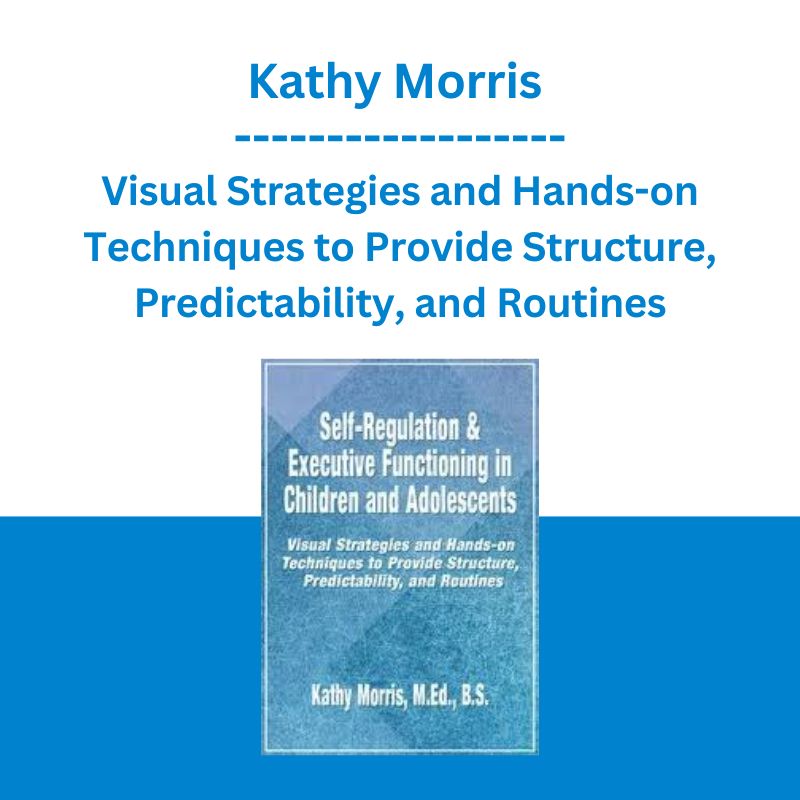*** Proof of Product ***
Exploring the Essential Features of “Kathy Morris – Self-Regulation & Executive Functioning in Children and Adolescents: Visual Strategies and Hands-on Techniques to Provide Structure, Predictability, and Routines”
Children and adolescents who struggle with self-regulation often look like they aren’t paying attention, lack self-control or have difficulty making transitions.
They tend to act out, get placed in timeout, or sent to the principal’s office—missing important learning and socializing time. Seemingly unaware of the consequences of their behavior these kids push boundaries even when given punitive consequences. We are familiar with the kids; the challenge becomes how to intervene.
In this workshop recording, learn the components of self-regulation that are crucial to understanding sensory, cognitive, behavioral, and psychological breakdowns of children.
You will learn how working memory, inhibitory control, and mental rigidity—components of Executive Functioning (EF) —impede self-regulation and how essential supporting self-regulation development is to improved EF.
The good news—self-regulation and EF skills can be taught!
Drawing on over 45 years of professional experience Kathy Morris, M.Ed., will teach you visual strategies and hands-on techniques that provide children structure, predictability and routines—components essential to supporting self-regulation.
Under Kathy’s expertise, you will learn:
- Communication strategies most effective when children are under stress
- Visual ques to alert of schedule changes, surprises and transitions to alleviate anxiety
- Video modeling scenarios to teach social skills and flexible thinking
- Powerful incentives to teach acceptable behaviors and problem-solving skills
- Visual supports to target desired behavior and provide clear direction
- And more!
Through video case studies, visual demonstrations of strategies and dynamic discussions, you will learn how to implement these strategies tomorrow morning at school, during therapy or counseling, home and community.
Speaker
Kathy Kaluza Morris, MEd, BS
igivuWings
Kathy Morris, MEd, BS, has had over 42 years of experience working with children and adolescents with severe behavioral difficulties including those with autism, ADHD and executive dysfunction. Her consulting firm, igivuWings, specializes in autism and behavioral issues. Kathy works directly with families, educators, counselors, speech pathologists, occupational therapists and medical professionals throughout the world.
She has been a speech therapist, teacher for self-contained programs, resource teacher and first grade teacher. Kathy was also a diagnostician/supervisor for all grade levels. She was a LIFE Skills/autism/behavior/assistive technology consultant at a Texas education service center before leaving to start her own business in 1999.
A prolific speaker, Kathy has keynoted many national/international conferences. She is a frequent guest on a local news program promoting research-based techniques for working with children and adolescents with ADHD, autism spectrum disorders, and executive functioning differences.
Her video, Facilitating the Classroom Learning of Students with Asperger Syndrome and High-Functioning Autism, Grades K-6, has been a popular addition for campus and district staff developments as well as for those in clinical practices. In addition, she has an audio CD, Practical Strategies for Working with Students with Social Cognitive Differences in the General Education Classroom.
Speaker Disclosures:
Financial: Kathy Morris is the owner of Igivu Wings and has employment relationships with Stetson and Associates and the Bureau of Education and Research. She receives a speaking honorarium and recording royalties from PESI, Inc. She has no relevant financial relationships with ineligible organizations.
Non-financial: Kathy Morris is the mother of adult children with autism spectrum disorders.
Objectives
- Articulate the metacognitive and self-regulation strands for executive functioning components and how a breakdown in one strand impacts the other strands of executive functioning.
- Implement visual strategies that support communication, social skills, and behavior skills and decrease dysregulation behaviors.
- Utilize case studies to illustrate and evaluate the concepts of inhibitory control, working memory, emotional control, and mental rigidity.
- Create treatment strategies to meet the needs of individual students demonstrating a lack of self-regulation skills to improve classroom behavior and performance.
- Discriminate between the functions of behaviors in order to determine whether a behavior is a tantrum or an executive function meltdown.
- Identify effective interventions and calming strategies when working with students who are overstimulated and experiencing sensory breakdowns.
- Implement a “system” of interventions rather than a person dependent intervention to increase the odds of interventions being effective and accessible in multiple settings.
Outline
Self-Regulation and Executive Functioning (EF)
- Neuroanatomy of the brain
- Mirror neurons
- Sensory issues vs. behavior issues
- Address communication breakdowns before they become social skills deficits
- Structure, predictability and routines to support self-regulation
- Research-based interventions
VISUAL STRATEGIES AND HANDS-ON TECHNIQUES TO PROVIDE STRUCTURE, PREDICTABILITY AND ROUTINES
Surprise Cards
- Engagement learning: Clock partners
- Eloise: Meltdown video
Social Scripts
- Caleb
- Aaron
- Video Monitoring: Case example
Power Cards
- Levels of talking: Video examples
- Sheldon: High interest area
- Power card example
- Creating power cards collaboratively
- Power cards for different age and developmental levels
Calming Strategies
- Emotional control
- Anxiety management video
- Emotions charts
- Relaxation schedules
- Calm down cards
- Breathe cards: Video
Self-Regulation Techniques
- Social stories formats: Video examples
- Me-Moves: Experiential practice
- T-Charts
Inhibitory Control
- Turtle technique
- Impulse control
- Positive behaviors flip books
- 1st then cards
- Now and next cards
- Key chain rules: Video Example
Target Audience
- GEN & SPED Teachers
- School-Based Personnel & Paraprofessionals
- Curriculum Directors
- School Administrators
- Speech-Language Pathologists
- Occupational Therapist
- Occupational Therapy Assistants
- Social Workers
- Counselors
- Psychologists
- Nurses
Please see the full list of alternative group-buy courses available here: https://lunacourse.com/shop/










 Atlas API Training - API 570 Exam Prep Training Course
Atlas API Training - API 570 Exam Prep Training Course  Trader Mike - The 10%ers - The 1% Club
Trader Mike - The 10%ers - The 1% Club